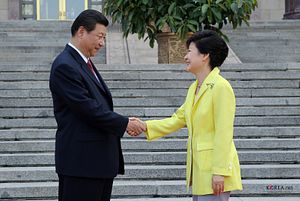Chinese President Xi Jinping arrived in South Korea on Thursday for a two-day visit. Qiu Guohong, China’s ambassador to Seoul, set the bar high by declaring to Korea JoongAng Daily that Xi’s visit “will certainly become the most important milestone in the history of exchanges between the two countries.” Despite this, don’t look for progress on the elephant in the room: China’s support for North Korea.
Outside of China, media analysis highlighted that Xi was breaking tradition by visiting Seoul before Pyongyang. South Korea’s presidential office even noted this in its briefing on Xi’s visit (although North Korea is referred to obliquely, as “other countries”). Many wondered if this meant that China was beginning to back away from its traditional role as North Korea’s staunchest supporter. Chinese media, however, are trying to avoid the North Korea question altogether. In the grand tradition of Chinese diplomacy, which focuses on sidelining differences in favor of win-win cooperation, Beijing hopes to move beyond the question of North Korea in its ties to South Korea.
In preparation for Xi’s visit to Seoul, Chinese media and officials proclaimed that China-South Korea relations “are now at their best in history.” As evidence, Xinhua cites the close trade relationship (China is South Korea’s largest trading partner; South Korea is China’s third largest), the number of tourists and foreign students traveling between the two nations, and the increased number of high-level official exchanges.
When it comes to security issues, China prefers to emphasize the common distrust the two countries have for Japan rather than dwelling on the North Korea question. Thus when Xinhua calls on China and South Korea to “live up to their shared and inescapable responsibility in maintaining regional tranquility,” it’s not a reference to the need for cooperation over North Korea’s nuclear program. Instead, the article focuses on Shinzo Abe’s militarism as the most pressing danger. As for the North Korea issue, Xinhua writes it off as a problem between North Korea and the United States — conveniently ignoring China’s role in propping up the Kim regime as well as South Korea’s fundamental security concerns about its northern neighbor.
Despite the implicit snub to Pyongyang in Xi’s decision to visit Seoul first, the official statements from China suggest there’s no policy change on the way. Ambassador Qiu emphasized China’s long-held position that it supports denuclearization of the Korean Peninsula, a goal to be achieved “through dialogue and negotiation.” Qiu made no mention of recent North Korea missile launches. The Foreign Ministry’s response to a question about the launches was a terse reply repeated the traditional Chinese manta: “We hope that parties concerned can do more to ease regional tension and jointly safeguard peace and stability of the Korean Peninsula.” Likewise, Xi urged “all parties concern” to “avoid causing tension.”
China is not going to drastically change its position on North Korea, but it’s unlikely that Seoul really expects this. And the issue of Pyongyang’s nuclear ambitions haven’t prevented South Korea and China from drawing closer together economically, or from banding together to denounce Japan’s war history and current policies. Both China and South Korea seem to have decided to focus on more promising aspects of the relationship, at least in their public remarks. South Korea, for obvious reasons, places a higher priority on increasing cooperation with China on dealing with North Korea, but Seoul will not derail the larger relationship over a lack of progress on this issue. Instead, both sides sought to make it clear that their relationship extends far beyond the issue of North Korea.
The achievements for this trip, then, have little to do with North Korea. Xi and Park promised progress on a free trade agreement between the two nations, setting a goal of wrapping up negotiations by the end of this year. In fact, the major focus of the whole visit is economic, with Xi bringing along an entourage of Chinese business leaders and attending unspecified “economic and trade events,” according to a Chinese Foreign Ministry briefing. The only noteworthy move on the North Korea issue was a section in a joint statement calling for a resumption of the Six Party Talks — China’s long-preferred method for tackling the nuclear question.
































